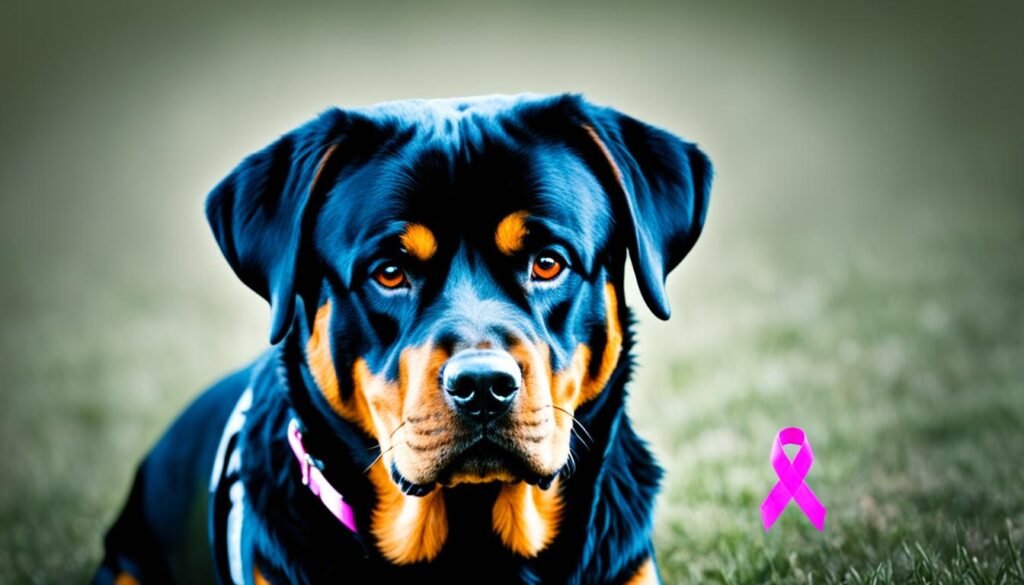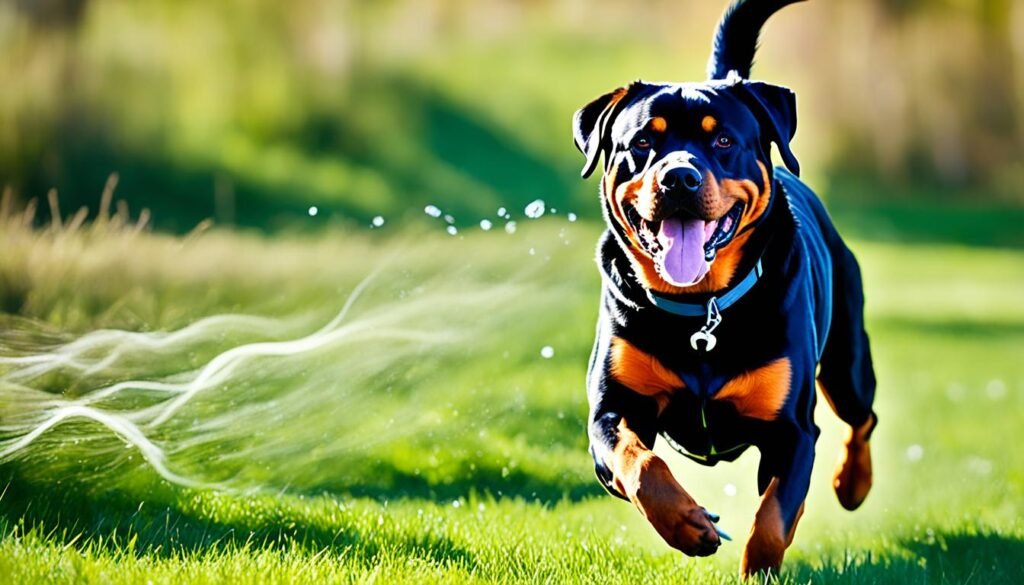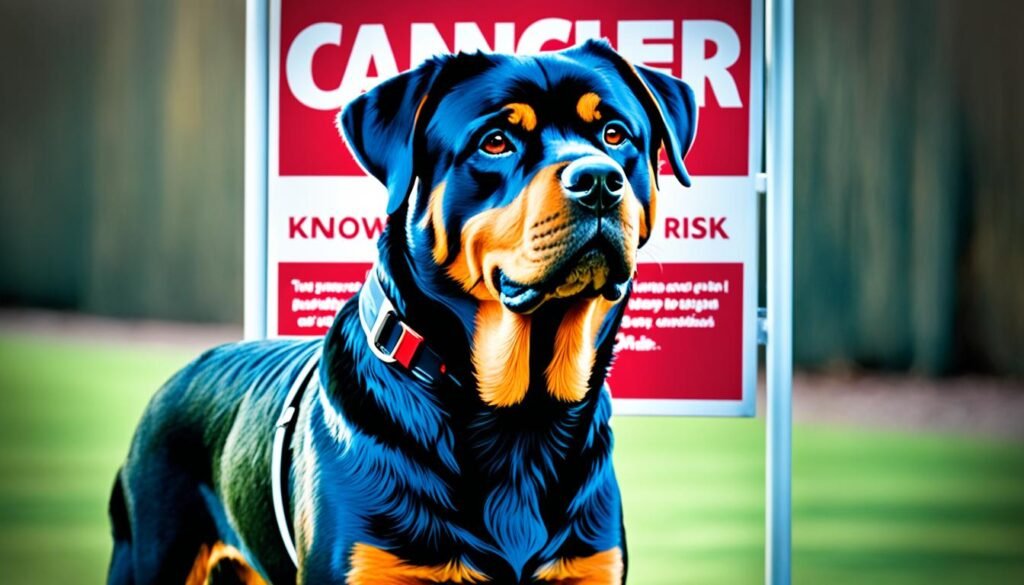As a proud owner of a Rottweiler, I understand the importance of providing the best care and attention to my furry friend. However, it’s crucial to be aware of the potential health risks that certain dog breeds, including Rottweilers, may face. One of the significant concerns for Rottweilers is their higher susceptibility to cancer.
While cancer can affect any dog, some breeds have a higher incidence of the disease. In fact, studies estimate that more than 50% of dog deaths due to illness are cancer-related. Rottweilers, in particular, are prone to several types of cancer, including lymphoma, mast cell tumors, soft tissue sarcomas, bone cancer, bladder cancer, and hemangiosarcomas.
Key Takeaways:
- Rottweilers have a higher risk of developing various types of cancer.
- Lymphoma, mast cell tumors, soft tissue sarcomas, bone cancer, bladder cancer, and hemangiosarcomas are common cancers in Rottweilers.
- Regular veterinary check-ups and early detection can improve treatment outcomes.
- Providing a balanced diet, regular exercise, and avoiding exposure to known carcinogens can potentially reduce the risk of cancer in Rottweilers.
- Genetic factors may contribute to cancer predisposition in Rottweilers.
Cancer Risk By Dog Breed
The risk of developing cancer can vary by breed. While the calculation of cancer risk in different dog breeds is complex, it is generally observed that larger breeds with longer lifespans are more likely to develop cancer simply because they live long enough for the disease to develop. Rottweilers, being a larger breed, have a higher risk of developing various types of cancer.
Statistics suggest that between 5% and 12% of Rottweilers may develop osteosarcoma, a type of bone cancer. This highlights the vulnerability of Rottweilers to cancer susceptibility. It is essential for Rottweiler owners to be aware of this increased risk and take proactive measures to promote their dog’s health and well-being.
As responsible pet owners, understanding the potential health risks is crucial for providing appropriate care and early intervention. By being aware of the cancer statistics specific to Rottweilers, we can ensure that our furry friends receive the necessary attention and support in managing their health.
Common Cancers in Rottweilers

Rottweilers are particularly prone to certain types of cancer. One of the most common cancers in Rottweilers is lymphoma, which affects the lymphatic system. This type of cancer can occur in various parts of the body, including lymph nodes, spleen, and bone marrow. It is essential for Rottweiler owners to be aware of this common cancer and to monitor their dogs for any signs or symptoms that may indicate the presence of lymphoma.
Another frequently diagnosed cancer in Rottweilers is mast cell tumors. These tumors originate from the mast cells, which are found in the skin and other tissues. Soft tissue sarcomas, which develop in the muscles, connective tissues, and blood vessels, are also relatively common in Rottweilers.
Rottweilers are also at a higher risk for developing bone cancer, known as osteosarcoma. This aggressive cancer affects the bones, often occurring in the limbs.
Bladder cancer is another type of cancer that can affect Rottweilers. It is important to monitor your dog for any urinary symptoms, such as blood in the urine or difficulty urinating.
Lastly, hemangiosarcomas are tumors that develop in the blood vessels of various tissues, including the spleen, liver, and heart. This type of cancer is often challenging to detect until it reaches an advanced stage.
As a responsible Rottweiler owner, it is crucial to be vigilant and proactive in monitoring your dog’s health. Regular vet check-ups, early detection, and timely treatment play a vital role in managing these common cancers in Rottweilers. Remember to consult your veterinarian if you notice any unusual symptoms or have concerns about your Rottweiler’s health.
Reducing Cancer Risk in Rottweilers

While it is not possible to completely eliminate the risk of cancer in Rottweilers or any other breed, there are steps that can be taken to potentially reduce the risk.
Providing a balanced diet, regular exercise, and maintaining a healthy weight can contribute to overall health and potentially lower the risk of cancer. A nutrient-rich diet with high-quality ingredients can support a strong immune system and help prevent cellular damage that may lead to cancer.
Exercise not only keeps Rottweilers physically fit but also helps regulate their weight. Obesity is a risk factor for various types of cancer, so it is important to ensure that Rottweilers engage in regular physical activity to maintain a healthy body weight.
Avoiding exposure to known carcinogens is another important preventive measure. For example, using natural alternatives to lawn chemicals and keeping Rottweilers away from areas treated with pesticides can reduce their exposure to harmful substances that may increase the risk of cancer. Additionally, secondhand smoke should be avoided, as it has been linked to an increased risk of cancer in dogs.
Regular veterinary check-ups are crucial in monitoring a Rottweiler’s health and catching any potential signs of cancer early. Routine physical examinations, blood tests, and imaging studies recommended by the veterinarian can aid in the detection of cancer in its early stages, when it is often more treatable.
By taking these preventative measures and staying vigilant about your Rottweiler’s health, you can help reduce their risk of developing cancer. While there are no guarantees, providing a healthy lifestyle and regular veterinary care can significantly increase the chances of keeping your beloved Rottweiler cancer-free and ensure they lead a long and happy life.
Rottweiler Health Concerns

As with all dog breeds, Rottweilers are susceptible to a variety of health concerns. In addition to cancer, there are several other health issues that Rottweilers may be prone to. These include:
- Hip and elbow dysplasia: This is a common condition in Rottweilers where the hip or elbow joints don’t develop properly, leading to pain and lameness.
- Arthritis: Rottweilers may be at a higher risk of developing arthritis, a condition characterized by joint inflammation and stiffness.
- Gastric dilatation and volvulus (bloat): Rottweilers are also more susceptible to bloat, a life-threatening condition where the stomach twists and fills with gas.
Regular veterinary care is essential for maintaining the health and well-being of Rottweilers. Preventive measures, such as vaccinations, parasite control, and routine check-ups, can help identify and address potential health concerns early on. Early intervention and proper management of these health concerns can significantly improve the overall quality of life for Rottweilers.
Genetic Predispositions for Rottweilers

The genetic basis for cancer predisposition in Rottweilers is yet to be fully understood. However, studies have shown that certain breeds, including Rottweilers, are more likely to develop specific types of cancer due to genetic factors. It is important for Rottweiler breeders to be aware of these genetic predispositions and make informed breeding decisions to help reduce the prevalence of cancer in future generations.
When it comes to cancer, genetics may play a significant role in a Rottweiler’s susceptibility. While the precise mechanisms are still being investigated, it is clear that certain genes can increase the risk of developing cancer in this breed. By understanding these genetic predispositions, breeders can make more informed decisions to reduce the prevalence of cancer. Selective breeding can help minimize the transmission of these genes, ultimately benefiting the health of Rottweilers.
Promising Research on Genetic Cancer Markers
Scientists are actively researching specific genetic markers that may indicate a higher risk of cancer in Rottweilers. By identifying these markers, it may be possible to develop screening tests that can detect potential cancer susceptibility at an early stage. This could enable veterinarians to implement preventative measures or establish more frequent monitoring for Rottweilers at higher risk. Ongoing research in this area holds promise for improved cancer prevention and management in this beloved breed.
- Genetic counseling: Rottweiler owners should consider consulting with a veterinarian or a genetic counselor who specializes in canine genetics. These professionals can provide valuable insights into the breed’s genetic predispositions and offer guidance on responsible breeding practices.
- Ethical breeding practices: Breeders have a crucial role in minimizing the incidence of cancer in Rottweilers. By focusing on health-tested breeding pairs and avoiding the lineage of dogs with known cancer predispositions, breeders can contribute to healthier puppies with reduced cancer risk.
By prioritizing responsible breeding and leveraging advances in genetic research, we have the potential to make significant strides in reducing the impact of cancer on Rottweilers. Together, we can protect the future generations of this magnificent breed and ensure a healthier, happier future for these beloved dogs.
Diagnosis and Treatment

When it comes to the diagnosis of cancer in Rottweilers, a comprehensive approach is typically taken. Veterinary professionals utilize a combination of physical examinations, blood tests, imaging studies such as X-rays or ultrasounds, and biopsies to determine the presence and extent of cancer in these beloved dogs.
Physical examinations play a crucial role in identifying any abnormal lumps, tumors, or growths on the Rottweiler’s body. Blood tests help to assess the overall health of the dog and may provide indicators of potential cancer presence. Imaging studies, such as X-rays or ultrasounds, enable veterinarians to visualize the internal structures and identify any abnormalities that may be indicative of cancer.
In cases where cancer is suspected, biopsies are often performed to collect tissue samples for further analysis. These samples are examined under a microscope by veterinary pathologists to determine the type of cancer, its stage, and the best course of treatment.
The treatment options for Rottweilers with cancer can vary depending on the type, stage, and location of the disease. Just like in humans, treatment may involve a multimodal approach combining surgery, chemotherapy, radiation therapy, and targeted therapies. The specific treatment plan is tailored to each individual dog and is determined by a team of veterinary specialists, including oncologists who specialize in the treatment of cancer in animals.
During surgery, the tumor or affected tissue is removed, aiming to eliminate as much of the cancer as possible. Chemotherapy utilizes drugs to destroy cancer cells and slow down the progression of the disease. Radiation therapy involves targeted radiation beams that destroy cancer cells while minimizing damage to healthy tissues. Targeted therapies utilize medications that specifically target certain types of cancer cells, with the goal of inhibiting their growth and spread.
It is important for Rottweiler owners to consult with veterinary specialists to ensure their pets receive the most appropriate and effective treatment for their specific cancer diagnosis. These experts in veterinary oncology have the knowledge and resources to provide advanced diagnostics and tailor treatment plans to give Rottweilers the best possible care.
Conclusion
While Rottweilers have a higher risk of developing certain types of cancer, it is important to remember that cancer can affect any dog. As a responsible owner, you can take steps to reduce the cancer risk in your Rottweiler and protect their overall health.
One crucial aspect of reducing cancer risk is providing a healthy lifestyle for your Rottweiler. This includes feeding them a balanced diet, providing regular exercise, and helping them maintain a healthy weight. These practices promote overall well-being and can potentially lower the risk of cancer.
In addition to a healthy lifestyle, regular veterinary care is essential. Schedule routine check-ups for your Rottweiler and consult your veterinarian about preventive measures specific to cancer. Early detection plays a significant role in improving outcomes for Rottweilers with cancer, so be vigilant for any signs or symptoms of illness and seek prompt medical attention if needed.
Remember, you are not alone in this journey. Veterinary specialists are available to provide advanced diagnostics and treatments for Rottweilers with cancer. By working closely with your veterinarian and following their guidance, you can ensure the best possible care for your beloved Rottweiler.
FAQ
Are Rottweilers more prone to developing cancer?
Yes, some dog breeds, including Rottweilers, are more prone to developing cancer. While any dog can develop cancer, certain breeds have a higher incidence of the disease.
What types of cancer are Rottweilers prone to?
Rottweilers are prone to several types of cancer, including lymphoma, mast cell tumors, soft tissue sarcomas, bone cancer, bladder cancer, and hemangiosarcomas.
How can I reduce the risk of cancer in my Rottweiler?
While it is not possible to completely eliminate the risk of cancer, providing a balanced diet, regular exercise, maintaining a healthy weight, and avoiding exposure to known carcinogens can potentially help reduce the risk of cancer in Rottweilers.
What other health concerns are common in Rottweilers?
In addition to cancer, Rottweilers may be prone to hip and elbow dysplasia, arthritis, and gastric dilatation and volvulus (bloat).
Is there a genetic basis for cancer predisposition in Rottweilers?
The genetic basis for cancer predisposition in Rottweilers is yet to be fully understood, but studies have shown that certain breeds, including Rottweilers, are more likely to develop specific types of cancer due to genetic factors.
How is cancer in Rottweilers diagnosed and treated?
The diagnosis of cancer in Rottweilers is typically made through a combination of physical examinations, blood tests, imaging studies, and biopsies. Treatment options may include surgery, chemotherapy, radiation therapy, and targeted therapies.
Can cancer affect any dog breed?
Yes, cancer can affect any dog breed. While Rottweilers have a higher risk of developing certain types of cancer, it is important for all dog owners to be aware of the signs and symptoms of cancer and seek veterinary care if needed.
